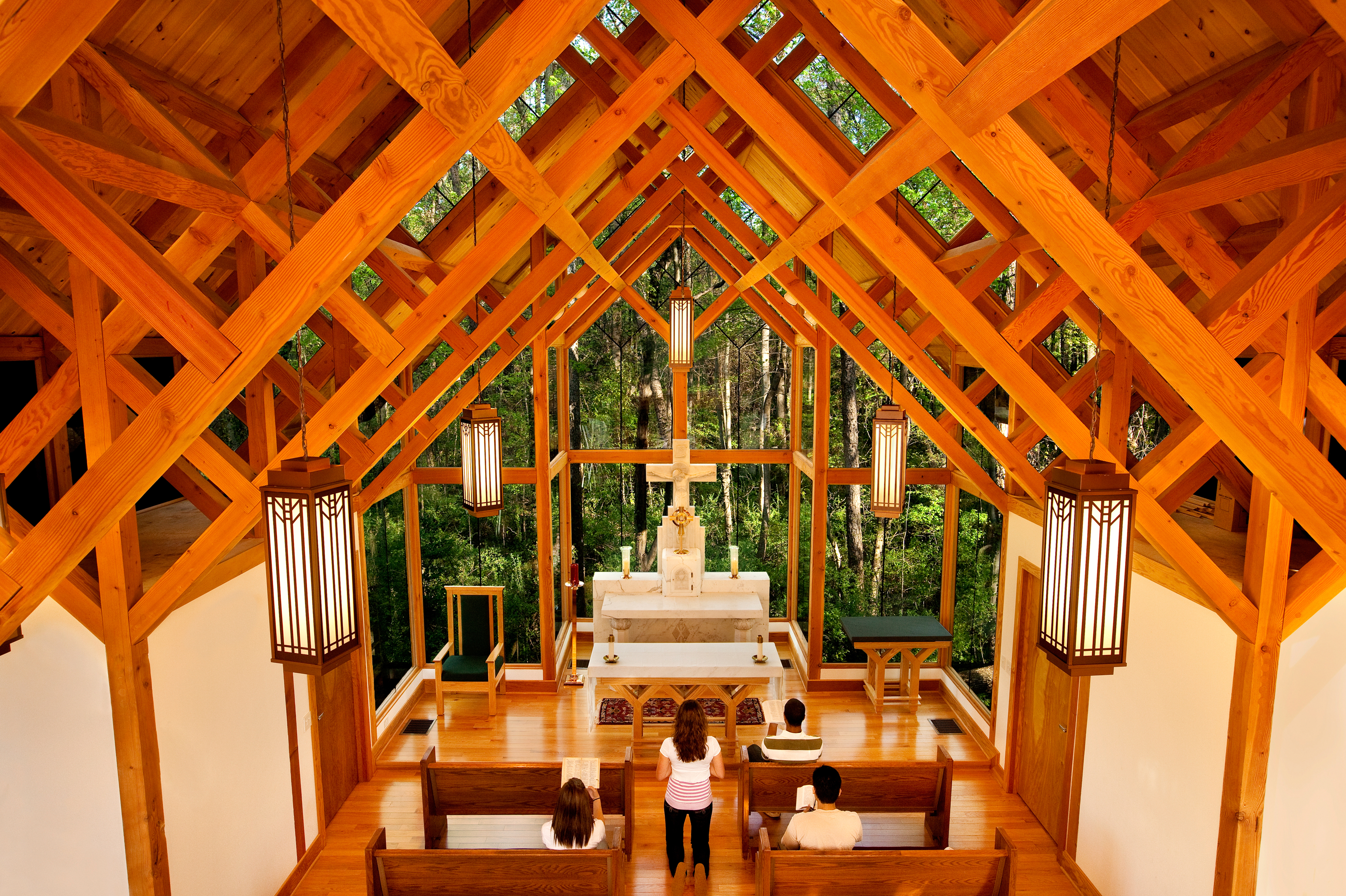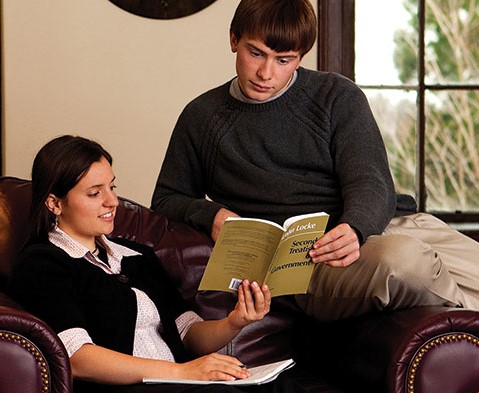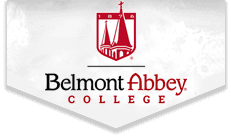
The Philosophy of a Catholic, Benedictine, Liberal Arts Education
As a Catholic educational institution, Belmont Abbey College reflects a Christian inspiration, recognizing the importance of faith in and reverence toward God. The College encourages all members of the community to cultivate a relationship with God by providing opportunities for moral and spiritual growth, by a curricular program in Theology and Philosophy, and by example through a continuing close relationship with the monastic community and through ecumenical programs.
The College is committed to the people of God and to the human family. Belmont Abbey encourages service by all members of the College to the local community through outreach programs. Through these activities, the College recognizes the inherent dignity of all individuals and expresses its desire to promote the common good through social justice, an active concern for others, and the rejection of all prejudice.
As a Catholic educational institution, the College recognizes its responsibility to search for understanding in the context of the Scriptural message as it comes to us through the Church. This requires constant application of the intellect and careful study of the human experience, together with reflection on, and reverence for, God. In its curriculum, the College exposes students to many of the world’s major problems and helps them develop a responsible social consciousness guided by Catholic teaching. Recognizing that intolerance and narrow sectarianism retard learning and the pursuit of truth and understanding, the College recognizes that the community benefits from the presence of people of different faiths, racial backgrounds, and cultures.
Outside the classroom, the Campus Ministry program offers students an opportunity to build a faith community through participation in sacramental liturgy, social issues, and group interaction.
St. Benedict’s Rule
Benedictine heritage and tradition are based on the Rule of Saint Benedict. It is necessary to examine some basic elements of the Rule in order to appreciate the corresponding values that influence the College community.

The Rule begins with the word “Listen.” Listening places a person in a receptive mode and promotes openness to life, to truth, and to communication. The monk is instructed to listen in order to be open to God, to others, and to all of creation. St. Benedict says in The Rule that he is establishing the monastery as a school for the Lord’s service. In this school, the monk seeks to learn wisdom and to grow in holiness.
The College encourages its faculty and students to cultivate a deep love of learning and an appreciation of the human faculties of mind and spirit. The College ensures that students are provided with sufficient space and quiet time to cultivate the habits of serious study and healthy reflection.
The Rule is permeated with reverence for God, for others, and for all of creation. Reverence for God is expressed through prayer. Prayer reminds the monk of God’s importance and it points to the presence of God in our midst, the divine dimension in human life. The College provides students with programs and opportunities designed to nourish their faith and encourage expressions of prayer and worship.
Reverence for others is expressed through living within a community. Community living is designed to moderate the extremes of individualism and competitiveness and to promote the common good.
Hence, community is the context in which the monk must live his daily life and relate to other people.
The College Community
The College fosters a spirit of community and helpfulness on campus through appropriate social activities that complement its intellectual aims. The Office of Student Life promotes programs and activities that provide wholesome and responsible social interaction.
Reverence for others is encouraged by providing an effective, just, and responsible system of social discipline on campus. Students are encouraged to develop an appreciation of good order and of the importance of relating to others in a responsible and peaceful way. Reverence for creation is expressed through the monk’s use of the environment and of the goods and property of the monastery. The monk understands that material goods and property are intended to serve the good of all and to enhance the quality of life.
Accordingly, the College actively encourages all to exercise a responsible care for buildings, equipment, and the campus grounds so that our environment will enhance and promote our academic mission. To help promote reverence for the environment, the College employs competent and effective maintenance, ground and housekeeping crews, and provides them with leadership and supervision.
As a liberal arts institution, Belmont Abbey College seeks to assist its students to become both liberally educated and well prepared for the tasks and responsibilities of professional life. Such an education implies a curriculum that integrates the traditional ends and means of liberal education with majors and minors that help prepare students for particular professions.
In an era when most college students need to plan their education around future careers, the College makes various majors and course concentrations readily available. These majors provide the facts, principles, and questions that form the crucial underpinnings of specific professions. When promoting its studies and programs, the College conveys facts of permanent or fundamental import as well as current developments and research in particular fields. In the course of such studies, due appreciation of work and of professional values is fostered along with growing competence in special areas of learning.
Since profession-oriented studies take place within an institution that is Catholic and Benedictine in character and within a liberal arts based curriculum, the College helps its students perceive professions in the broader perspectives of just action, the common good, and environmental concern. Such an approach helps nurture a sense of commitment that goes beyond autonomous efficiency and can temper the unrestrained pursuit of profit and prestige.
Cultivating the Mind
Most broadly stated, a liberal education cultivates the mind. A mind properly cultivated enhances one’s humanity and graces one with thoughtfulness, openness, and the spirit of inquiry in the most important areas of life: faith, family, friendship, community, work, and leisure.
 The College curriculum provides a liberal education in three ways. First, liberal education seeks to promote the acquisition of knowledge through particular arts, skills, and abilities. Traditionally, these have been known as the “liberal arts” because of their liberating character and because of their close connection to the intellect, as opposed to those arts that are manual in character or ordered primarily to some external product. Strictly speaking, the liberal arts are intended to develop the mind in, of, and for itself. The arts, skills, and abilities being developed are reading, writing, speaking, listening, and reasoning (mathematic, analytic, synthetic, and critical).
The College curriculum provides a liberal education in three ways. First, liberal education seeks to promote the acquisition of knowledge through particular arts, skills, and abilities. Traditionally, these have been known as the “liberal arts” because of their liberating character and because of their close connection to the intellect, as opposed to those arts that are manual in character or ordered primarily to some external product. Strictly speaking, the liberal arts are intended to develop the mind in, of, and for itself. The arts, skills, and abilities being developed are reading, writing, speaking, listening, and reasoning (mathematic, analytic, synthetic, and critical).
Second, liberal education aims to acquaint or introduce students to particular areas of investigation and knowledge and to the questions, facts, principles, and methods found in them. Most important are those areas having to do with God, humanity, and nature. None of these three fields of study belongs exclusively to one particular discipline. They may be treated in different ways and from differing perspectives in several disciplines. Among the disciplines shedding light on one or more of these matters are theology, literature, history, the natural sciences, political philosophy, sociology, economics, and psychology.
Third, liberal education seeks to foster exploration of life’s most important questions and of the various answers that great, thoughtful, and influential persons have provided in both the past and the present. Here, too, the formulation of questions and responses is not the exclusive domain of any one discipline. Indeed, adequate appreciation of such issues often requires reaching across disciplines or transcending disciplines in order to confront questions in a holistic fashion. One of the goals of a liberal arts education is to be able to integrate what one learns through faith and reason. Such integration is critical to the humanistic formation of the whole person, enabling young men and women to be at once persons of integrity and faith, responsible citizens, and specialists in a given academic discipline.
A liberal education fosters an appreciation of what is beautiful, a growing awareness of what is good, and a quest for truth through a thorough examination of life’s most important perennial and contemporary questions.
Student Recruitment
In pursuit of the good, the true and the beautiful, Belmont Abbey College seeks to attract students who are compatible with its purpose and educational mission, namely students who:
- have the potential, the commitment, and the character to master the skills, knowledge, and concepts of liberal learning;
- are open to the transcendent dimension of life and willing to cultivate a deeper relationship to God through faith and prayer;
- have, or have the potential to develop sufficient maturity and self-discipline to respect other persons, property, and the campus environment, and to make a meaningful contribution, whether inside or outside the classroom, toward constant improvement in the quality of campus life;
- and are mostly drawn from various geographical locations both inside the state of North Carolina and within the eastern portion of the United States so that the College maintains its regional identity while providing a diversity of viewpoints to enrich intellectual and social development.


